Imagine being all surrounded by water, everywhere you look right outside your front door. To go anywhere, you must take pull the boat around and paddle. Going to school requires a 10 minute paddle. Need veggies for dinner? Better grow your own on the front porch. Bathing? That’s easy… right off your doorstep is a whole flooded plain to take a dip. Need soap for the bath? Lucky for you, the grocery boat comes around occasionally full of household products to purchase right off the back of the boat.
This is the lifestyle of the natives of the Kompong Phluk village community. Built in the floodplain of the Tonle Sap, three villages with a total population of about 3,000 people live on stilted homes above the water. Also called the “Flooded Forest”, even the trees, many of which are mangroves, have adapted to this lifestyle of spending many months of each year underwater.
During the dry season, the long stilts upon which these wood and bamboo homes are built are exposed due to the lack of water. During this season, the homes, like skyscrapers, are high up on stilts, more than 20 feet in the air. At this time, the Tonle Sap Lake at 12,000 sq km is one of the biggest freshwater lakes in Asia. This is mainly due to the fact that the river from which the lake drains actually reverses direction in the wet season, causing the river to flow backward into the lake instead of draining it. This is due to the Mekong River backing up, causing the Tonle Sap River to back up into this food zone, causing the Tonle Sap to increase fivefold in size with over fifty times the volume of water! Fascinating stuff!
The ride to the boat dock was about 10 miles SE of Siem Reap. Even before we arrived at the dock, it felt like quite a trip. We drove down small roads where our driver pointed out big lakes that were actual farm land most months of the year. Imagine buying some beautiful farm land only to have it immersed under 15-20 feet of water only months later! (I don’t suppose anyone sells flood insurance here!) Apparently, many of the villagers are farmers during the dry season and fisherman during the wet season which sounds quite logical.
From here we definitely saw how the other half live. Even on the road out, the homes were wooden, up on stilts themselves during the high water. We had not yet made it all the way the floodplain, so these homes were a mere 10 feet or so up in the air. Under the homes, life continued despite the water. Cooking and tables were set up under the homes, children played games, people talked with family and friends, harvested veggies, worked on motorcycles, and the local children swam and bathed in the river alongside the road.
As we got closer to the dock, there was more and more standing water on the road. The driver skillfully avoided potholes and large puddles until the road in front of us became submerged 2-3 feet. Did this stop our Cambodian driver from making his drop? Not at all! He simply turned off the air conditioning intake and kept on driving through. (In case you don’t believe the depth of the water, when we returned in the evening along this same road, the headlights of his car were actually submerged!)
At the dock, boats were lined up, tied together, waiting for adventurous tourists. In order to get to our driver’s boat, we had to first walk over a thin balance beam across a ditch, and then climb across all the closer boats to get to the outside boat. Finally, with the longboat to ourselves, we headed out.
We motored for almost an hour through former farmland, now nothing more than a gigantic lake with tree tops sticking up out of the water. The driver seemed to be following some sort of route although how he knew the river route from any other area out there was a mystery to me.
Finally, we arrived at the floating villages of Komplog Phluk. We passed by the police station, the elementary school, a monastery,… even a restaurant. I kept wondering how they stay in business in this seemingly isolated area. The homes themselves were simply single one-room shacks, looking a little precariously balanced on their high stilts.
The locals were friendly, smiling and waving to us as we motored by. Kids laughed and splashed around in the water. Other passengers waved and we shared a knowing smile, sharing the same surreal experience.
We continued all the way through the villages until we reached Tonle Lake. We knew we’d hit the lake only because the driver told us. It looked just the same as the floodplain minus the treetops.
The plan had been to travel the route at sunset, and we ended up landing at a big pier. I am still not sure if it actually was a pier as there was no real way up to without climbing precariously on to the top of the boat and hoisting ourselves onto it. But apparently, that is how it was done. By the time the sun was setting, the pier was quite crowded with tourists and their cameras. The fresh air and the view were breathtaking, and we took many photos ourselves.
We headed out just moments before the sun went dark. Big cumulus clouds had been welling up in the sky for a while that afternoon and sure enough, the lightning and thunder started on our way back. Within moments of the sunset, it was completely dark out in the floodplains. As you can imagine, there are no lights of any kind to speak of. None of the boats had lights, and I wondered to myself how the driver would have made it back through that one hour boat ride back without the bright half moon in the sky that night.
We arrived back at the pier and to our driver exhilarated with the whole experience. Being out on the water, seeing a floating village, and holding the sun in our hands… Incredible!
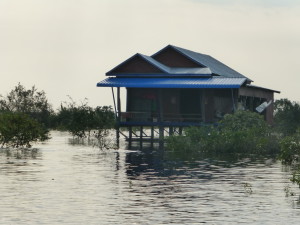
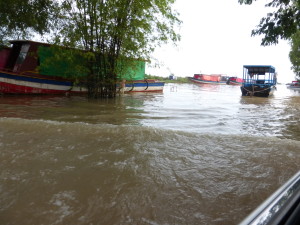
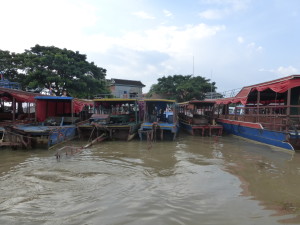
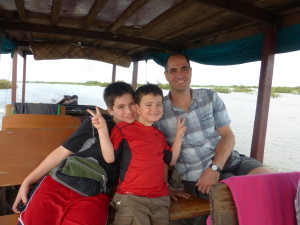
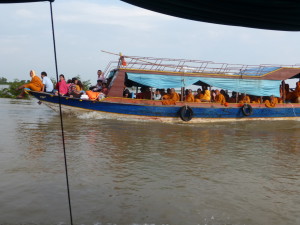
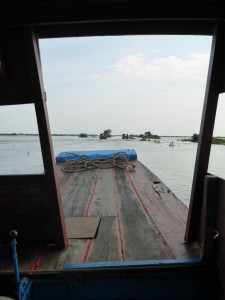
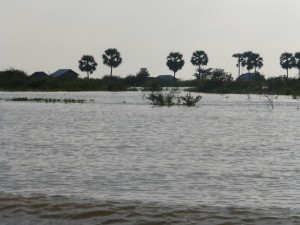
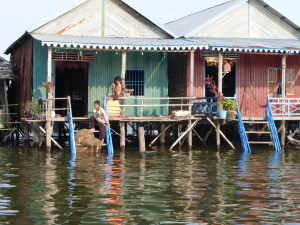
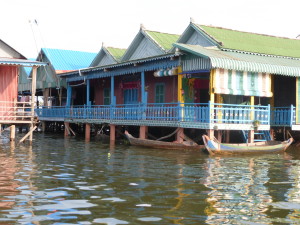
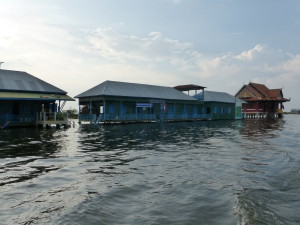
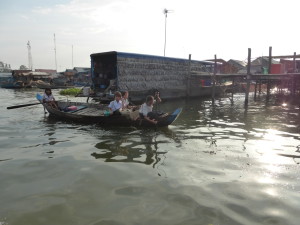
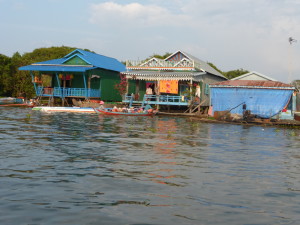
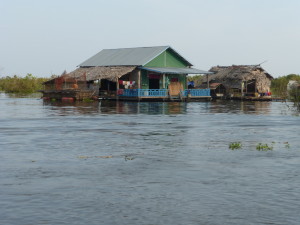
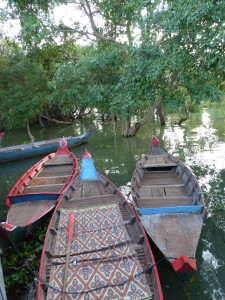
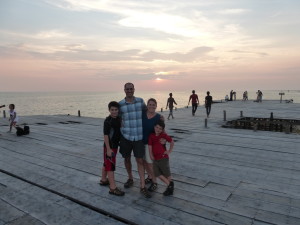
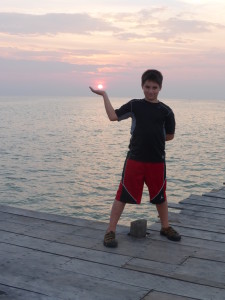
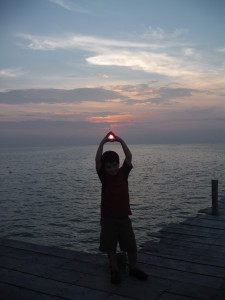
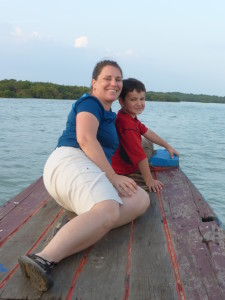
wow, so cool
Thanks for following!
Thanks for reading and commenting! 🙂
What an amazing journey. It is amazing what becomes “normal” and living on a lake part of the year and in the lake part of the year, is a pretty huge transformation. I’m sure this should put not being able to find parking in perspective…I’ll work on it.
No kidding, huh? We are learning LOTS of perspective this year! 🙂
How you are all well! – K
Did you do this with a tour company or just a driver?
It was our driver’s suggestion. He drove us out there. It was super interesting.